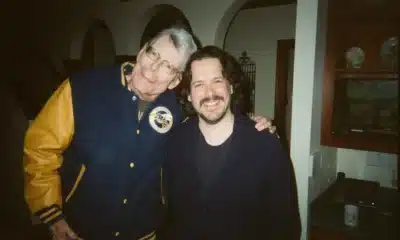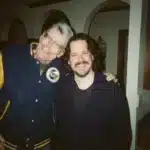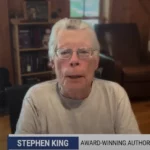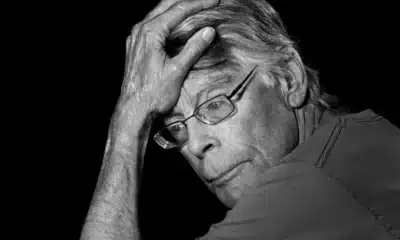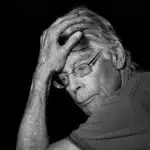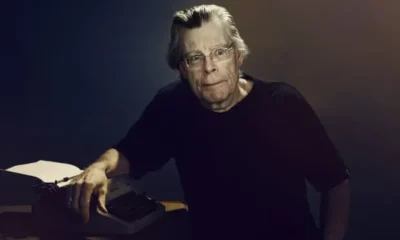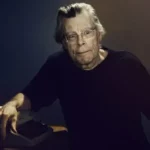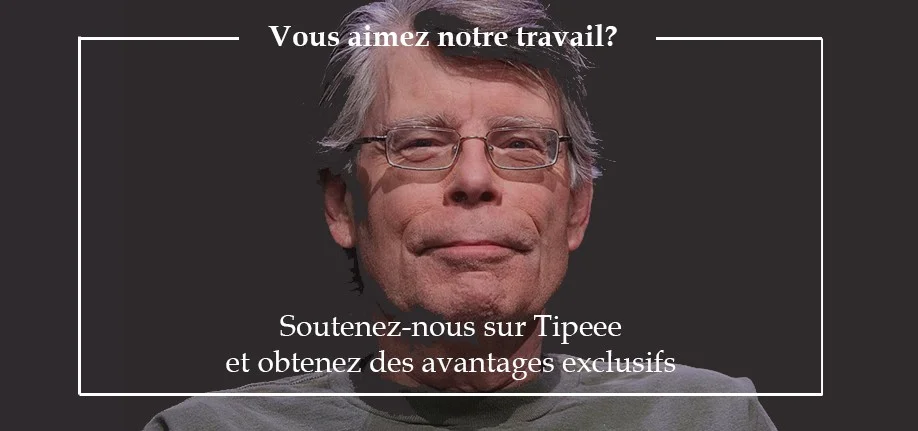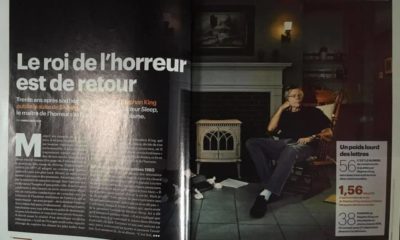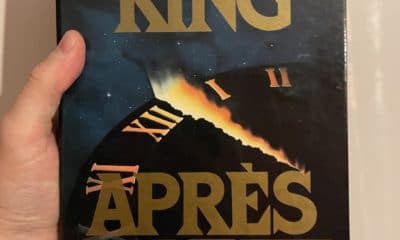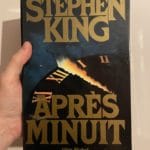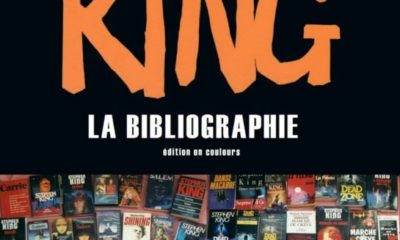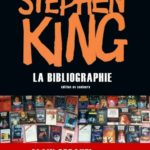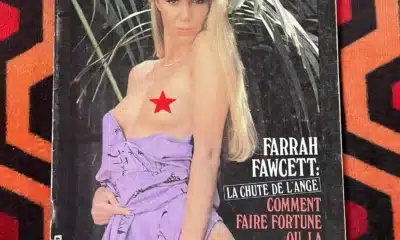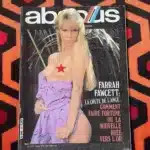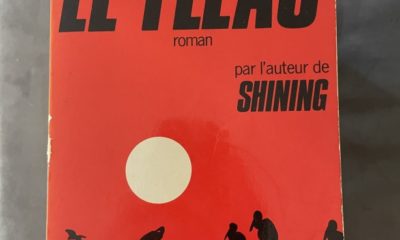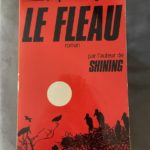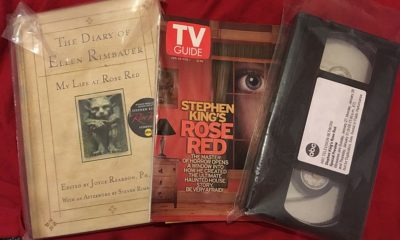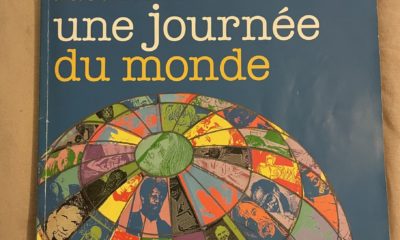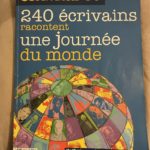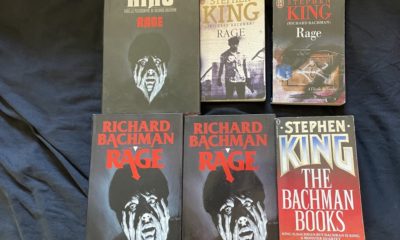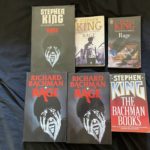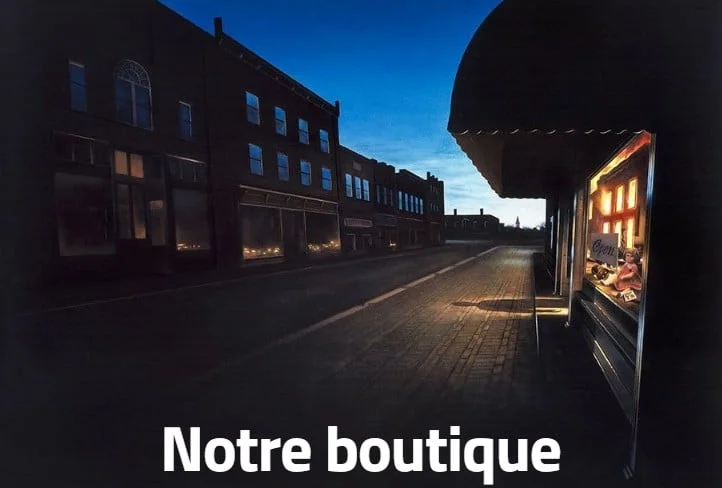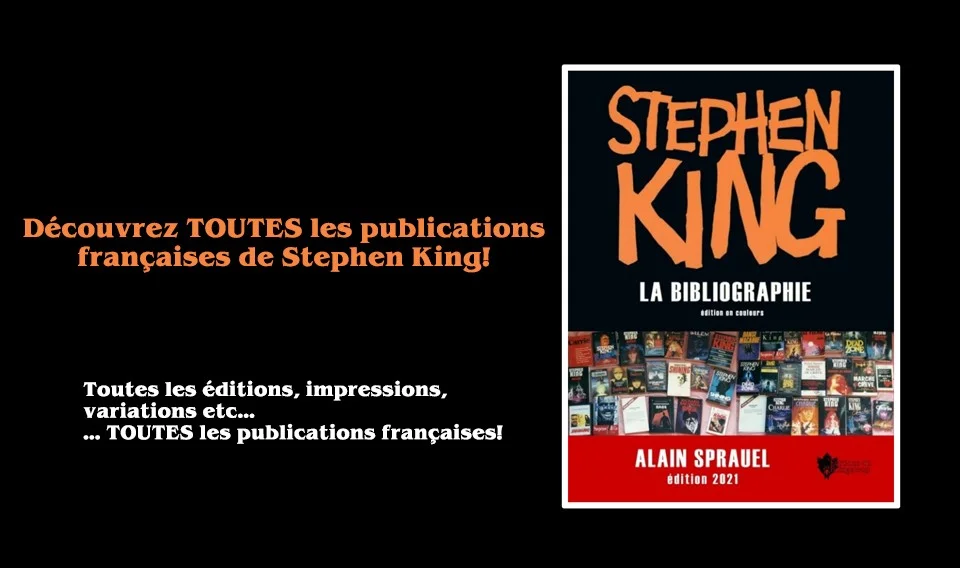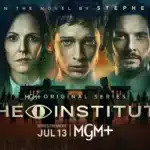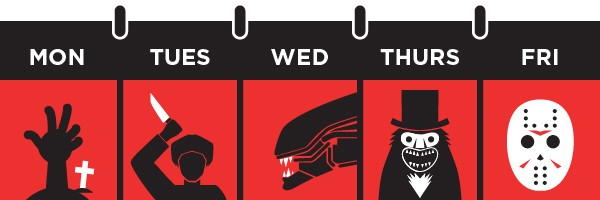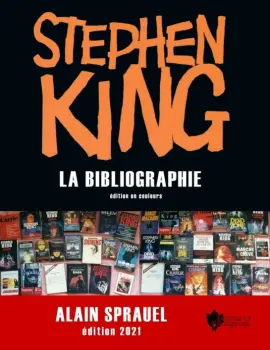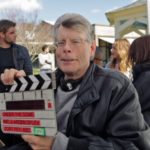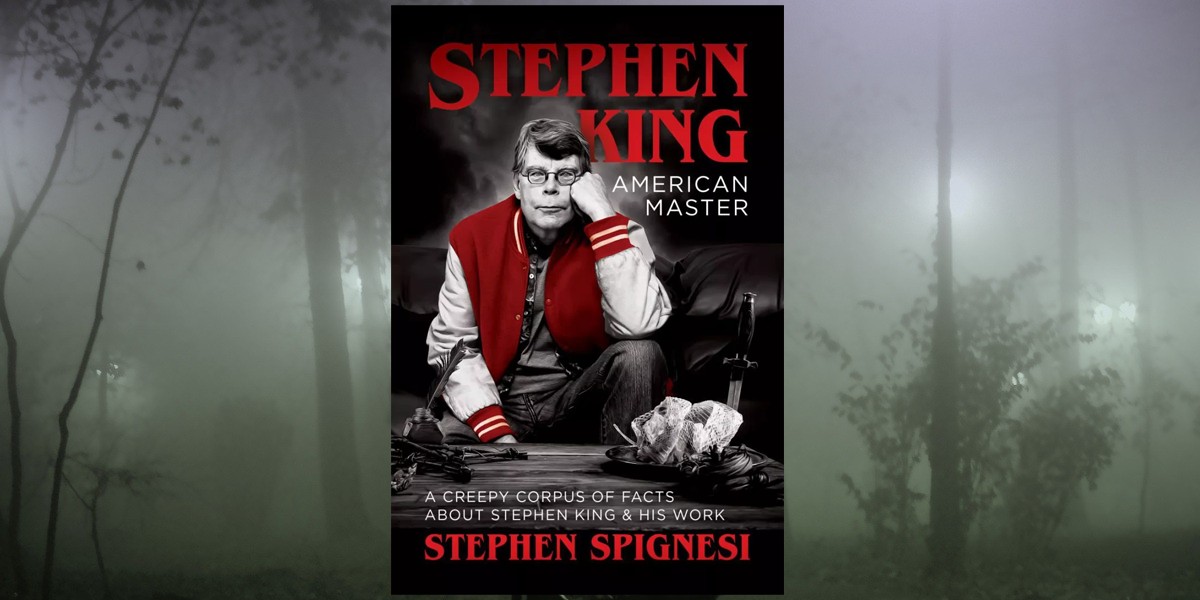
A l’occasion de la sortie du livre « Stephen King, American Master : A Creepy Corpus of Facts About Stephen King & His Work » (dont le titre peut se traduire en : « Stephen King, Maitre Américain : un effrayant corpus de faits au sujet de Stephen King et son oeuvre ») , nous avons proposé à Stephen Spignesi, son auteur, de participer à une interview.
Si vous souhaitez découvrir les livres de Stephen Spignesi sur Stephen King :

Club Stephen King: Bonjour Stephen, merci d’avoir accepté cette interview. Pour les fans et collectionneurs de Stephen King, votre nom est du même acabit que celui de George Beahm, un autre expert ayant écrit un certain nombre de livres au sujet de Stephen King. Pouvez-vous s’il vous plait nous dire comment vous avez découvert Stephen King et ce qui vous semble intéressant chez le personnage ainsi que son œuvre littéraire ?
Stephen Spignesi: Bonjour et merci de m’avoir invité. J’étais un fan de Stephen King bien avant de commencer à écrire à son sujet. Mon premier King était « Shining », que j’ai lu en 1977. Je l’ai adoré et l’ai dévoré. Je ne pouvais tourner les pages assez vite.
A cette période, j’écrivais une encyclopédie de pop culture intitulée « Mayberry, My Home Town ». C’était au sujet du « Andy Griffith Show », une sitcom américaine très populaire et il s’agissait d’un abécédaire de toutes les personnes, lieux et choses qui se trouvaient dans les 249 épisodes. Alors que je travaillais dessus, je continuais à lire Stephen King, et, au début des années 80, j’ai eu l’idée d’adapter la même approche encyclopédique au sujet de King et de son œuvre. Cinq ans plus tard, mon livre « The Shape Under the Sheet : the complete Stephen King encyclopedia » fut publié par le même éditeur qui commercialisa mon livre « Mayberry ». Je n’avais pas réalisé, lorsque j’avais décidé de le faire, qu’il nécessiterai autant de travail. C’est la raison pour laquelle il a pris bien plus de temps de recherche et d’écriture.
A la question de pourquoi je le trouve intéressant, ainsi qu’important à étudier, la première réponse est que son œuvre est divertissante à lire. Il est un conteur hors pair avec une voix narrative extraordinaire. De plus, il est un auteur pour tous les âges, et son œuvre lui survivra.
Un des essais dans mon livre « Stephen King : American Master » est écrit par Bev Vincent, une authorité autour de Stephen King, auteur de « The Road to the Dark Tower » par exemple. Son essai est intitulé « Est-ce que les gens liront toujours Stephen King en 2068 ? »
Sa réponse est oui, bien entendu qu’ils le liront. Les meilleurs textes de King survivront sans l’ombre d’un doute, tout comme les meilleurs de Twain, Dickens, Poe et Lovecraft et bien d’autres auteurs iconiques qui ont survécu.
Et ce qui est formidable c’est que nous vivons actuellement la période durant laquelle Stephen King écrit et publie de nouveaux textes. Cette notion est d’ailleurs valable pour la dernière question de cette interview. Donc je me sens privilégier d’en être témoin, ainsi qu’un reporter de l’œuvre de ce talent américain majeur et contemporain, ce maitre américain.
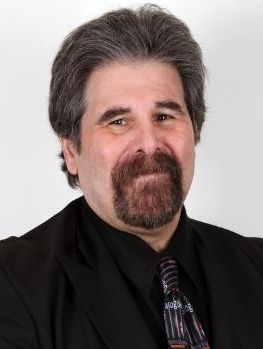
CSK: L’autre jour, quelqu’un a posté une photo de Stephen King étant soulevé par deux personnes, demandant de qui il s’agissait. Vous avez immédiatement répondu, sans aucune hésitation.
Vous avez prouvé, une nouvelle fois, si c’était nécessaire, que vous le connaissez et que vous avez des connaissances profondes à son sujet ainsi que de l’industrie de genre. Avez-vous déjà rencontré Stephen King ? Ou d’autres auteurs « connus » de genre ?
SS: Oui, c’était Stephen King qui était porté (il était littéralement porté dans les airs) par mes amis David Lowell, un écrivain, et Larry Fire, qui possède un site intitule “Fire Wire” au sujet de la pop culture.
La photo avait été prise par Dave Hinchberger et fut publiée dans ma « Complete Stephen King Encyclopedia »
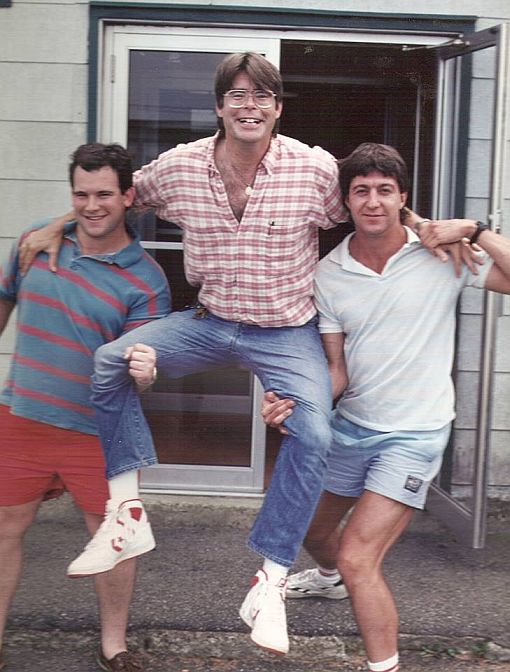
Quant à moi, je n’ai pas eu le privilège de rencontrer personnellement le King, bien que jai passé du temps avec l’inimitable Owen King.
J’ai seulement brièvement parlé avec Stephen King en personne, une fois, lorsque je travaillais sur l’encyclopédie. J’ai appelé son bureau pour parler à sa secrétaire Shirley au sujet de l’interview que j’avais fait avec elle, et il a répondu le téléphone, mais c’est tout. Par contre, il acquiesça qu’elle m’envoie des documents pour le livre. Un jour, j’espère être pouvoir le rencontrer et avoir une brève discussion avec lui. Je suis un grand fan.
Pour les autres auteurs de genre, je connais Dean Koontz et Stuart Woods, ainsi que Richard Christian Matheson et Ray Garton parmi tant d’autres. Je connaissais Harlan Ellison. C’est une communauté relativement petite, donc il parait inévitable que nous nous croisions tous, un jour ou l’autre, soit en personne, soit en ligne.
CSK: Vous avez écrit un certain nombre de livres autour de Stephen King. Sans prendre en compte celui qui vient de sortir, quel est votre préféré ?
Avez-vous une anecdote amusante à nous raconter au sujet de vos livres?
SS: Mon “Encyclopédie Complète de Stephen King” aura toujours une place particulière dans mon cœur. C’était mon premier livre au sujet de King, et elle m’a pris 5 ans de recherche et d’écriture, avec un assistant. Ma mère, en fait. Quant au livre sur lequel j’ai préféré écrire, c’était « The Essential Stephen King », simplement parce qu’ai pu relire l’ensemble de l’œuvre de Stephen King, ce qui était plutôt amusant.
Concernant l’anecdote au sujet de mes livres, en voilà une qui est en quelque sorte amusante. Quand je fais des lectures illustrées autour de mes livres, je suis toujours présenté comme un expert de Stephen King, puis mes livres sur King sont mentionnés, quel que soit le sujet sur lequel je vais parler à cet événement. Après la discussion, de nombreuses personnes viennent ensuite me parler du sujet que j’ai évoqué ce jour ci, bien entendu, mais je rencontre aussi de nombreux fans de Stephen King.
Ces lecteurs fidèles sont toujours très au courant des publications de Stephen King, discutant au sujet de l’écrivain, et bon nombre d’entre eux sont réellement des personnes intéressantes avec qui échanger. Puis, il y a ceux qui viennent me voir juste pour me dire qu’ils adorent ou détestent les films de Stephen King. J’essaie de profiter de l’opportunité pour leur rappeler qu’ils devraient se focalisés sur les livres. Cela arrive à chaque fois.
Personnellement, je considère les adaptations comme un « second tiers » de l’expérience kingienne. Cependant, je conçois les œuvres cinématiques créées et écrites par King, comme « La tempête du siècle » comme faisant partie intégrante de son œuvre.
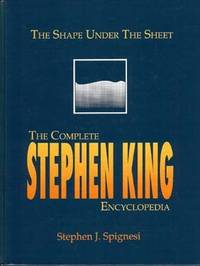
CSK: Parmi vos livres se trouvent The Lost Work of Stephen King. Quelle nouvelle rare et inedited de Stephen King préférez-vous?
Etait-ce amusant de travailler sur un livre de raretés et de curiosités dont la majorité d’entre nous ne sera jamais en mesure de voir ?
SS: Travailler sur cet ouvrage était une des expériences les plus plaisantes et enrichissantes que j’ai jamais eu sur un livre. Les histoires inédites et les manuscrits sont un aperçu de la créativité cachée d’un auteur.
Le texte « perdu » que je préfère est probablement la nouvelle « Squad D », que King a écrit pour que le regretté Harlan Ellison puisse l’intégrer dans le troisième volume de l’anthologie des « Dangerous Visions », qui finit par ne jamais voir le jour. C’est une histoire très poignante. Et nous avons appris cette année que King a autorisé la publication de la nouvelle dans une nouvelle anthologie de Cemetery Dance. Les fans vont enfin avoir la chance de lire ce texte après toutes ces années.
Lire notre article au sujet de la publication de « Squad D » de Stephen King
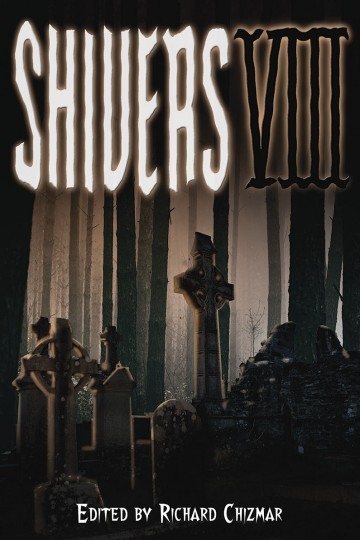
CSK: Pouvez-vous s’il vous plait nous en dire plus sur votre “Stephen King, American Master: A Creepy Corpus of Facts About Stephen King & His Work”? Comment le décrireriez-vous?
SS: “Stephen King : American Master” se décompose en deux parties. La première est une collection éclectique d’interviews avec des autorités autour de Stephen King, avec des essais écris par des experts. On y retrouve Bev Vincent, Mick Garris, Robin Furth Michael Collings, Tyson Blue et de nombreuses autres personnes maitrisant le sujet de King et son œuvre, évoquant un large spectrum de sujets kingiens.
La deuxième partie est un aperçu divertissant de la quasi-totalité de l’œuvre de King, écrite et discuter d’un point de vue informationnel.
J’y inclus également un regard sur ses textes qui n’ont pas été intégrés dans ses recueils de nouvelles, des pièces rares et tout un lot d’essais.
La première partie est à lire. La seconde est également pour lire, bien entendu, mais elle peut-être parcourue et on peut s’y plonger à guise. Vous voulez en savoir plus sur la nouvelle pièce de théâtre « Thin Scenery » ? Vous pouvez vous rendre à sa section et lire à son sujet. Etc.
Son contenu ravira les fidèles lecteurs, mais aussi les fans occasionnels ne lisant que les best sellers.
Permuted Press publie la version de base. Dave Hinchberger et Overlook Connection Press commercialiseront une édition limitée du livre, probablement en trois différentes variations.
CSK: Comme vous le disiez, ce livre est présenté comme intéressant à la fois pour des fans “novices” qui ne connaissent que très peu l’auteur, ou des fans plus assidus. Pouvez-vous nous raconter une anecdote que la majorité d’entre nous ne savent pas ?
SS: Quand on me pose cette question, je me rapporte toujours à cette anecdote que Stephen King lui-même évoque. Il l’a répété à plusieurs reprises, mais certains fans ne l’ont peut-être pas entendu.
Une femme l’a approché dans un supermarché de Floride, et lui as dit : « Je sais qui vous êtes. Je n’aime pas vos livres. » Donc King lui as dit « Vous avez vu Les Evadés ? » Ce à quoi elle répond : « Oh, oui. C’est un de mes films préférés. » King lui dit alors : « J’ai écrit cette histoire ». La femme lui rétorque : « Non, ce n’est pas vrai », et s’éloigne. C’est hilarant !
Pour une autre anecdote, intéressante : la novella « Le policier des bibliothèques » (publié dans le recueil « Minuit 2/ Minuit 4 ») lui fut inspirée par la véritable peur de son fils Owen de rendre tardivement un livre à la bibliothèque et de se voir kidnappé par un effrayant policier de bibliothèque. Il l’a dit à son père et voilà : une terrifiante novella de Stephen King !
Et dans un style pas très amusant : le type qui a renversé King avec son van en 1999, est décédé plus tard d’une overdose le jour de l’anniversaire de Stephen King.
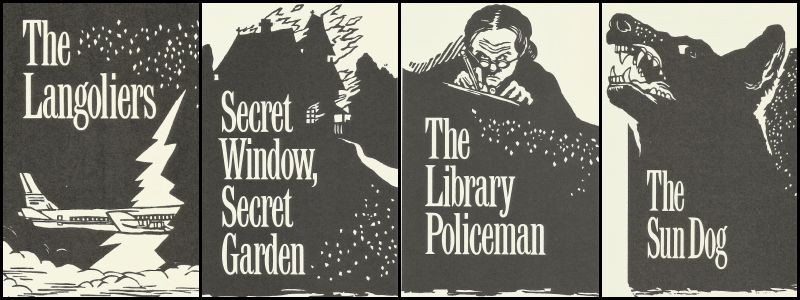
CSK: Retournons un peu à Stephen King : quel est votre livre préféré?
SS: J’aime à peu près tout ce qu’il a écrit. J’aime beaucoup son style, que ce soit au travers de ses fictions ou de ses essais. Parmi mes préférés : “Ça”, “Le Fléau”, “Shining”, “Misery”, “22/11/63”; “Revival, “La Ligne Verte”, “Docteur Sleep”, “Jessie”, “Marche ou crève”, “L’outsider”; “Ecriture”, “Salem”, “Dead Zone”, et ses recueil “Danse Macabre, “Minuit 2 / Minuit 4”, “Brume”, “Différentes Saisons” et “Le Bazaar des Mauvais Rêves », et bien trop de nouvelles et essais pour les lister.
Curieusement, je connais des fans de King qui ne lisent pas les recueils de nouvelles. Ils ne lisent que les romans. J’aime ses récits les plus courts et je trouve qu’il est particulièrement talentueux sous ce format. (Je suis un fan des nouvelles. D’où mon amour pour l’œuvre de Raymond Carver, que je mentionne un peu plus tard dans cette interview).
Cet qui est intéressant à ce sujet c’est que ces fans déclarent tous la même chose : ils n’arrivent pas à s’immerger dans une nouvelle de la même manière qu’avec les romans de King. Cela évoque la capacité de King a complètement capturer la sensibilité du lecteur. Mais je les averti qu’ils passent à côté de formidables lectures en délaissant ses récits les plus courts.
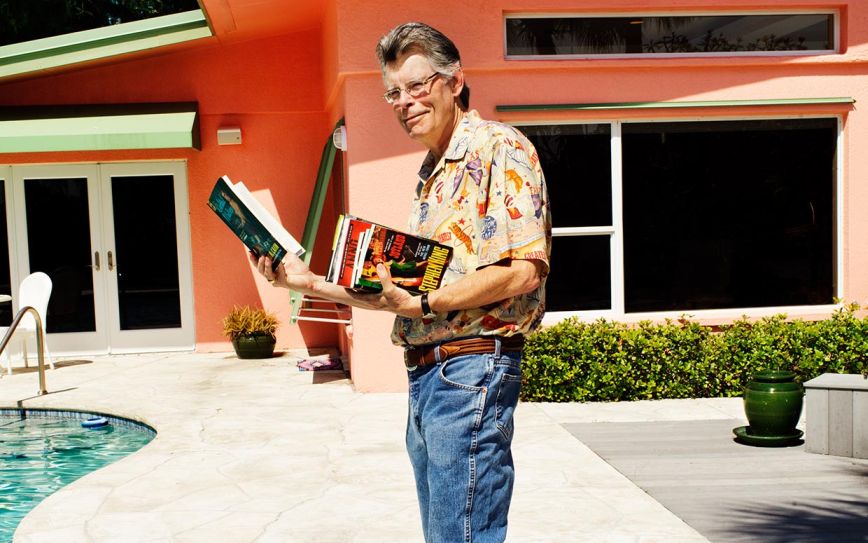
CSK: Payez-vous attention aux livres autour de Stephen King? Quel est votre préféré ?
Y a-t-il un sujet qui n’a pas encore été traité qui vous intrigue ?
SS: Je fais attention aux autres livres portant sur l’œuvre de King, mais dans une moindre mesure. Je suis intéressé par le respect croissant envers ses travaux, et je suis intrigué sur l’interprétation qu’en ont les autres auteurs. Par exemple, un livre a récemment été publié sur les éléments théologiques dans la fiction de King. C’est un sujet qui était généralement réservé aux auteurs du passé, comme Poe, Dickens, Twain, Faulkner, Steinbeck, Proust, Hemingway, James, etc. Mais maintenant King est perçu bien plus sérieusement comme un auteur littéraire et donc j’essaie de suivre les ouvrages à son sujet, bien que je ne m’attarde pas vraiment sur les biographies non autorisées. Je suis davantage intéressé par King en tant qu’écrivain. Je l’ai toujours été.
Mes livres préférés sur King sont “Stephen King : the Art of Darkness” par Douglas Winter, “The Stephen King Universe” par Stanley Wiater, Hank Wagner & Christopher Golden, ainsi que la troisième édition de “The Stephen King Companion” par George Beahm.
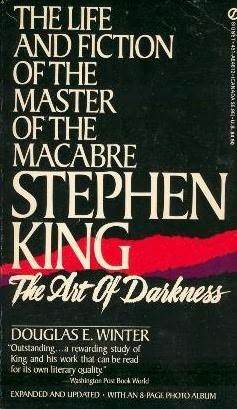
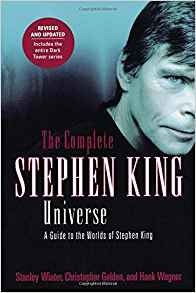
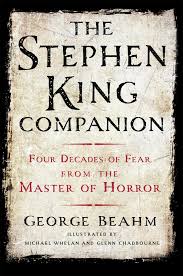
CSK: Vous avez écrit un certain nombre de livres autour de divers sujets, dont JFK Jr., George Washington, les présidents américains et les pères fondateurs, l’histoire amérindienne, la Bible, le Titanic, la série Urgences, le comédien Robin Williams, l’auteur et réalisateur Woody Allen, le film « Autant en emporte le vent », les Beatles et même les OVNIS et les crop circles.
C’est un spectre de sujet relativement large. Comment choisissez-vous ce sur quoi vous écrivez? Etes-vous aussi passionné et pointilleux sur tous ces sujets ? Y a t’il des sujets que vous n’avez pas encore traité que vous envisagez?
SS: J’ai écrit et publié près de 80 livre maintenant, et probablement la moitié d’entre eux, ou plus, portaient sur des sujets qui m’intéressaient personnellement. Les autres ont été des ouvrages qui m’ont été proposés.
Ce qu’un certain nombre d’auteurs sont surpris d’apprendre, c’est que de nombreux éditeurs ont une liste de « Livres à la recherche d’auteurs ». Les éditeurs ont régulièrement des « réunions d’idées » qui débouchent sur des idées d’ouvrages. Dans certains cas, ils partent ensuite à la recherche d’un auteur avec qui ils ont déjà travaillé et leur demandent si ils sont intéressés par le livre en question.
J’écris à temps complet depuis 25 ans et je suis connu de la plupart des gros éditeurs, donc on me contacte souvent pour cela. J’ai accepté la majorité d’entre eux parce qu’en tant qu’écrivain, une des règles est d’amasser le plus de travail possible pour pouvoir s’en sortir. J’ai refusé quelques idées, principalement parce que je n’aurai pas été l’auteur adéquat pour l’ouvrage. Des livres de sport par exemple. Puisque je n’ai aucun intérêt pour les sports, donc je ne voulais pas perdre mon temps à effectuer des recherches et écrire sur ces sujets. (C’est d’ailleurs pourquoi, les livres « Faithful » de King sur l’équipe des Boston Red Sox, et son essai « Head Down » sur la little league, ne font pas partie de mes textes préférés).
J’ai eu la chance, par contre, que la majorité des livres qui m’ont été proposé portaient sur des sujets qui m’intéressent. Je suis également assez discipliné, donc si on me propose un livre sur sujet que je connais peu, mais qui m’intéresse, je plonge dedans et m’efforce de faire des recherches de manière à pouvoir écrire le livre en question.
Mes livres sur Robin Williams et John F. Kennedy étaient de ceux-là.
Woody Allen, les Ovnis, la série « Urgences », le Titanic, les Présidents, les Pères Fondateurs, mes quatre livres sur les Beatles et bien d’autres étaient mes idées. Et bien entendu, ceux sur Stephen King étaient aussi mes idées.
Quant aux nouvelles idées, j’ai actuellement des propositions pour une douzaine de nouveaux livres soumises par mon agent aux éditeurs, autour de savants, de Leonardo Da Vinci, des déboires médicaux des personnalités historiques, des exécutions tout au long de l’histoire, et même pour la nouvelle série « Billions » de Showtime. Notre point de vue étant qu’il faut toujours proposer un certain nombre de concepts et idées novateurs pour que si tout va bien l’un d’eux sera accepté par les éditeurs pour séduire les lecteurs.
CSK: Comment arrivez-vous à écrire tous ces livres tout en étant à la fois professeur d’université?
SS: Je n’enseigne plus à l’université maintenant. Cet été, cela fera deux ans que j’ai pris ma retraite en tant que médecin traitant en résidence à l’université de New Haven. J’ai écrit à temps plein pendant 25 ans, puis j’ai enseigné la Composition et la Littérature pendant une dizaine d’années entre 2006-2007 et 2016.
C’était quand l’industrie de l’édition rencontrait des difficultés et qu’il m’était difficile de me faire salaire décent en écrivant. Durant cette période, j’écrivains à temps partiel tout en enseignant. Maintenant que je suis à nouveau en mesure d’écrire à temps complet, j’ai publié 5 livres en 2 ans. Je fais aussi des lectures illustrées dans des bibliothèques, m’inspirant de 15 de mes ouvrages.
Concernant ce que je produis, je considère l’écriture comme un boulot : j’écris tous les jours, et c’est incroyable ce que l’on peut réaliser avec un emploi du temps. Regardez Stephen King. Il décrit incessamment son emploi du temps comme « j’écris tous les jours ».
Et j’adore ça, tout comme Stephen King, et on retourne à ce vieux proverbe : quand on aime son travail, ce n’est pas un travail.
CSK: Faisant abstraction de Stephen King, qui sont vos auteurs prefers? Si vous arrivez à trouver le temps de lire !
SS: Je tends à lire beaucoup d’essais. Quant à la fiction, mon auteur préféré du moment est Raymond Carver. Je possède l’édition publiée par « Library of America » de ses nouvelles et c’est un trésor de virtuosité. J’aime aussi revisiter les classiques : Twain, Dickens, Melville, Poe, etc, plutôt que la fiction contemporaine. J’aime la science-fiction; je relis Tolkien régulièrement; j’aime Walt Whitman, Charles Bukowski, Auden, Yeats, et T.S. Eliot pour la poésie. Surtout Eliot.
Mais votre instinct a raison : avec toute mon écriture, je n’ai pas autant de temps que j’aimerai pour lire. Quand j’ai fini ma journée passée sur le bureau, je me penche souvent sur ma collection de DVD. Je suis un grand collectionneur de séries sur DVD, et j’aime regarder à nouveau des séries. Parmi mes préférés : Les Sopranos, Six Feet Under, Deadwood, Boston Legal, Justified, Game of Thrones, Breadking Bad, Downtown Abbey, House, Numb3rs, Curb your enthousiasm, Northern Exposure, The West Wing, The Newsroom, The Larry Sanders Show, Star Trek, Urgences, Fringe, Better Cault Saul…
Je suis aussi en train d’écrire le pilote d’une série, une comédie se déroulant dans une bijouterie durant les années 80/90s.
CSK: Merci d’avoir pris le temps de répondre à mes questions. Souhaiteriez-vous ajouter quelque chose ? Y a-t-il une question que je ne vous ai pas posée mais que vous auriez voulu que je vous pose ?
SS: Je n’ai pas de questions que vous n’ayez pas déjà pose : votre recherché et vos questions étaient excellentes, et je vous en remercie !
Quant à quelque chose que j’aimerai ajouter, je dirai ceci : nous ne devrions pas considérer comme acquis les génies et talentueux artistes avec qui nous vivons actuellement et qui continuent à créer. Paul McCartney, Stephen King, Sting, Aaron Sorkin, Bob Dylan, Kate Bush, Jeff Lynne, Joyce Carol Oates, Martin Scorsese, Quentin Tarantino, Donald Fagen, etc.
J’ai vu un article après le décès de David Bowie dans lequel son auteur manifestait de la surprise quant au fait que David Bowie était généralement perçu comme un génie. Bien sûr.
Quiconque suivant sa carrière aurait été e mesure de dire à l’auteur que Bowie était un génie, il parait donc évident que l’auteur fait ce que j’essaie d’avertir : il a considéré David Bowie comme acquis. C’est aussi arrivé avec des commentaires au sujet de la carrière de Robin Williams après son décès. Nous ne devrions pas faire cela.
L’art vit pour toujours, les artistes sont périssables.
Et avec cela, laissez-moi vous dire encore merci de m’avoir invité à discuter avec les membres du Club Stephen King !
Que vos journées soient longues et vos nuits plaisantes !
Je me suis bien amusé !
Si vous souhaitez commander le livre « Stephen King – American Master »

The original interview, in english
Club Stephen King: Hello Stephen, and thanks a lot for this interview. For Stephen King fans and collectors, your name is definitely on par with George Beahm, another King expert who has written quite a few books about him. Would you mind telling me how you got into Stephen King’s books and what makes him and his literary work so interesting for you?
Stephen Spignesi: Hello, and thanks for inviting me to talk to Club Stephen King.
I was a Stephen King fan long before I started writing about him. My first King book was The Shining, which I read in 1977. I loved it and sped through it. I couldn’t turn the pages fast enough.
At that time, I was writing a pop culture encyclopedia called Mayberry, My Home Town. It was about the very popular American show, The Andy Griffith Show, and was an alphabetical encyclopedia of all the people, places, and things in all 249 episodes of the show. As I was working on it, I was continuing to read King and, in the early 80s, I came up with the idea of taking the same encyclopedic approach to King’s work as I was doing for the show. Five years later, The Shape Under the Sheet: The Complete Stephen King Encyclopedia was published by the same publisher who did my Mayberry book. I didn’t realize when I decided to do it how much work would be required. That’s why it took so much longer to research and write.
As to why I consider him interesting, as well as important enough to study and write about, the first and foremost answer is that his work is entertaining to read. He is a premiere storyteller with an extraordinary narrative voice. Second, I think he is a writer for the ages and that his work will survive.
One of the essays in Stephen King, American Master is by the renowned King authority Bev Vincent, author of The Road to the Dark Tower and other works. It’s called “Will People Still Be Reading Stephen King in 2068?” The answer to Bev’s question is, yes, of course they will. The best of King will undoubtedly survive, just as the best of Twain, and Dickens, and Poe, and Lovecraft, and many other iconic writers has survived. And what’s great is that we’re living though the period when Stephen King is writing and publishing new work. (This notion also speaks to the last question of this interview, by the way.) So I feel privileged to be a witness and a reporter on the work of a major contemporary American talent, an American master.
CSK: The other day, someone posted a picture of Stephen King being picked up by two other people, asking who they were. You immediately replied, without any hesitation. You proved it with the books you wrote about him, but you definitely have a deep knowledge of him as well as the publishing industry and the genre. Have you ever met Stephen King? Any other significant genre authors?
SS: Yes, that was SK being held up (literally—he was being picked up in the air) by my friends Dave Lowell, a novelist, and Larry Fire, who has a pop culture website called the Fire Wire. The picture was taken by Dave Hinchberger and was first published in my Complete Stephen King Encyclopedia.

As for me, I have not had the privilege of personally meeting Sai King himself, although I know, and have spent time with a King scion, the inimitable Mr. Owen King. I only spoke to King himself personally one time when I was working on the Encyclopedia. I called his office to speak to his secretary Shirley about the interview I did with her for the Encyclopedia and he answered the phone, but that’s it. He did approve her sending me materials for the book, though. Someday I hope to be in the same place as the Master and have a brief chat with him. I’m a big fan.
As for other genre authors, I know Dean Koontz, and Stuart Woods, and RC Matheson, and Ray Garton, and many others. I knew Harlan Ellison. It’s a relatively small community, so it’s inevitable that we will all, at one time or another, “bump into” the men and women of our genre, either in person somewhere or online.
CSK: You have written quite a few books about King. Not counting the upcoming one, which is your favorite? Do you have any interesting trivia or funny anecdotes to share about your books?
SS: My Complete Stephen King Encyclopedia will always have a special place in my heart. It was my first book about King, and it took five years to research and write, with one assistant (my mother, in fact). As for which book I enjoyed working on the most, it was The Essential Stephen King, just because I got to re-read and go over King’s entire body of work, which was great fun.
As for trivia about my books, here is one anecdote that’s kind of amusing. When I do illustrated lectures based on my books, I’m always introduced as a Stephen King expert, and then my King books are mentioned, regardless of what I’m talking about at that event. After the talks, I am always swarmed by people interested in whatever topic I talked about that day, of course, but I also meet lots of King fans. These Constant Readers are always up-to-date on King’s published works, conversant in King, and many are genuinely interesting conversationalists. Then there are those who come up to me just to tell that they love, or hate, Stephen King’s movies. I tend to use that opportunity to good-naturedly remind them that it’s the books they should be focused on. Happens all the time.
Personally, I deem movie adaptations a “second tier” King experience. However, I do perceive original King cinematic creations, written by King—Storm of the Century, for example—as part of the King canon.

CSK: Among your books about King is The Lost Work of Stephen King. Which of the unpublished stories that you have accessed, do you prefer? Was it fun to work on such a book about oddities and rarities, items that most of us King fans will probably never be able to reach?
SS: Working on Lost Work was one of the most enjoyable and enlightening experiences I’ve ever had working on a book. Unpublished stories and manuscripts are glimpses into the unseen creativity of a writer.
My favorite “lost” work is probably the short story “Squad D,” which King wrote for the late great Harlan Ellison for the third Dangerous Visions anthology, which ended up never being published. It’s a very poignant story. And we just learned this year that King has approved the publication of the story in a new anthology to be published by Cemetery Dance. So, fans will finally get a chance to read it after all these years.

CSK: Can you tell us more about your upcoming book Stephen King, American Master: A Creepy Corpus of Facts About Stephen King & His Work? How would you describe it?
SS: Stephen King, American Master is in two parts: The first part is an eclectic collection of interviews with King authorities, and essays written by King experts. We’ve got Bev Vincent, Mick Garris, Robin Furth, Michael Collings, Tyson Blue, and many more people very knowledgeable about King and his work, talking about a wide range of SK topics. Part 2 is an entertaining look at almost King’s entire body of work, written about and discussed in informative and fun bullet points of fact.
I also include looks at uncollected works, rarities, and a wide array of King’s nonfiction writing.
Part 1 is for reading; l Part 2 is also for reading, of course, but Part 2 can be browsed and dipped into at will. Want to learn something about King’s new play Thin Scenery? You can look up that section and read about the play. And so forth.
It has content that will appeal not only to Constant Readers, but also somewhat more casual fans who only read the best sellers.
Permuted Press is publishing the trade paperback edition. Dave Hinchberger and the Overlook Connection Press is publishing a signed limited edition of the book in, possibly, three different design states.
CSK: As you say, the book is presented as interesting both for “new” fans that do not necessarily know the author very much, as well as more “hardcore fans.” Can you share with us a funny story that many of us may not know about King?
SS: When asked that question, I always defer to one of the stories King himself has told. He’s used it several times, but some fans may not have heard it.
A woman came up to him in a Florida grocery store and said, “I know who you are. I don’t like your books.” So King said, “Have you seen The Shawshank Redemption?” And she replied, “Oh, yes. That’s one of my favorite movies.” King then said, “I wrote that story.” The woman looked at him, said, “No, you didn’t,” and walked away. Hilarious!
As for an interesting piece of trivia, the novella The Library Policeman was inspired by King’s son Owen’s real fear that if he was late returning a library book, a scary Library Policeman would come and get him. He told that to his father and voila!—a chilling Stephen King novella.
Plus, here’s a not-so-funny story: the guy who hit King with a van in 1999 later died of a drug overdose on Stephen King’s birthday.

CSK: To get back to Stephen King, what is your favorite book?
SS: I like pretty much everything he has written. I really enjoy his authorial voice, whether it’s his fiction or nonfiction. Some personal favorites include IT; The Stand; The Shining; Misery; 11/22/63; Revival; The Green Mile; Dr. Sleep; Gerald’s Game,; The Long Walk, The Outsider; On Writing; ‘Salem’s Lot; The Dead Zone; the collections Night Shift, Four Past Midnight, Skeleton Crew; Different Seasons, and Bazaar of Bad Dreams; and too many short stories and nonfiction essays to name.
Interestingly, I personally know King fans who don’t read the short story collections. They only read the novels. I love King’s shorter works and think he’s an extraordinarily good short story writer. (I’m a short story fan. Thus, my love for the work of Raymond Carver that I mention later in this interview.) What’s interesting about this is that these fans all say the same thing: they can’t get immersed in a short story the way they do with King’s novels. This speaks to King’s gift for completely capturing the sensibility of the reader. But I do caution them that they are missing out on some truly great reading by eschewing his shorter works.

CSK: Do you pay attention to books about Stephen King? Which is your favorite? Is there a subject that hasn’t been tackled that intrigues you?
SS: I do pay attention to other books about King’s work, but on a somewhat limited basis. I’m interested in the increasing respect and gravitas assigned to his work, and I am intrigued as to how other writers interpret his stuff. For instance, a book was recently published about the theological elements in King’s fiction. This is a topic usually reserved for writers of the past, like Poe, Dickens, Twain, Faulkner, Steinbeck, Proust, Hemingway, James, etc. But now King is being taken much more seriously as a literary writer and so I try to keep up with books about him, although I don’t spend much time on the unauthorized biographical stuff. I’m more interested in King as a writer. I always have been.
My favorite books about King are Stephen King: The Art of Darkness by Douglas Winter, The Stephen King Universe by Stanley Wiater, Hank Wagner, and Christopher Golden; and the third edition of George Beahm’s The Stephen King Companion.



CSK: You have also written numerous other books about miscellaneous subjects, including books about JFK Jr., George Washington, the US Presidents and Founding Fathers, Native American History, the Bible, the Titanic, the series ER, the comedian Robin Williams, the writer and director Woody Allen, the movie Gone with the Wind, the Beatles and even UFOs and crop circles. That’s quite a spectrum of subjects. How do you choose what to write about? Are you as much a hardcore fan about all of those? Are there any subjects that you haven’t tapped yet that you want to one day?
SS: I’ve written and published close to 80 books by now and probably half or more were subjects that personally interested me. The others were books that were offered to me.
What a lot of writers are surprised to learn is that many publishers have a list of “Books Looking for Writers.” Publishers have “idea meetings” on a regular basis and many of the editors come up with ideas for books. In some cases, they will then go to an author they’ve worked with and ask if they’d be interested in doing the book.
I wrote full-time for 25 years and established a track record with most of the major publishers, so we would get offers like this quite often. I accepted most of them because I was a working writer and one of the rules is to grab as much work as possible to stay afloat. I did turn down some ideas, mainly because I wouldn’t have been the right writer for the book. Sports books, for example. I have no interest in sports at any level, so I didn’t want to spend time researching and writing books about sports. (This is why, by the way, that King’s Boston Red Sox book Faithful and his Little League essay “Head Down” are not favorites of mine.)
I was fortunate, though, that most of the books offered to me were about topics that interested me. I’m also pretty disciplined, so if I was offered a book deal on a topic that interested me, but about which I wasn’t particularly knowledgeable, I would dive in and do the research and try to become as informed as I needed to be to write the book. My Robin Williams and John F. Kennedy Jr. books happened that way.
Woody Allen, UFOs, ER, Titanic, the Presidents, the Founding Fathers, my four books about The Beatles, and many others were my own ideas. And of course, all my Stephen King books were my own ideas.
As for new ideas, I currently have proposals for more than a dozen new books making the rounds of publishers via my agent, including books about savants, Leonardo Da Vinci, medical woes of the historically famous, executions throughout history, and even the new Showtime series Billions. Our thinking is to always offer lots of fresh concepts and ideas and hopefully one or more will sell to publishers, and then appeal to readers.
CSK: How do you even manage to find the time to write all those books, and be a university professor?
SS: I’m not teaching college anymore. This August will be two years that I’m retired as a Practitioner in Residence from the University of New Haven. I wrote full-time for 25 years and then taught Composition and Literature at my alma mater for ten years or so between 2006-7 and 2016. This was when the publishing industry had tightened up and it wasn’t possible for me to make a decent living writing full-time. I wrote part-time during the period that I was teaching. Now that I’m back to full-time writing, I’ve had five books published in the two years since I’ve been retired. I also do illustrated lectures at libraries based on 15 of my books.
As to my output, I treat writing as a job: I write every day, and it’s amazing what you can produce with that schedule. Just look at Stephen King. He has repeatedly described his schedule as essentially “I write every day.” But I love it, as does SK, and we tend to both embrace the old adage that goes, “When you love your work, it’s not work.”
CSK: Besides Stephen King, who are your favorite authors? If you manage to find the time to read!
SS: I tend to read lots of nonfiction. As for fiction, my current personal favorite writer is Raymond Carver. I have the Library of America edition of his short stories and it is a treasure trove of brilliance. I also tend to re-visit the classics—Twain, Dickens, Melville, Poe, etc.—more so than read contemporary fiction. I love science fiction; I re-read Tolkien regularly; I love Walt Whitman, Charles Bukowski, Auden, Yeats, and T.S. Eliot for poetry. Especially Eliot.
But your instinct is right: with all my writing, I don’t have as much time to read as I would like. When I’m done at the desk for the day, I tend to turn to my DVD collection. I’m a big collector of TV on DVD and I love to rewatch superb shows that are personal favorites: The Sopranos, Six Feet Under, Deadwood, Boston Legal, Justified, Game of Thrones, Breaking Bad, Downton Abbey, House, Numb3rs, Curb Your Enthusiasm, Northern Exposure, The West Wing, The Newsroom, The Larry Sanders Show, the Star Trek series; ER, Fringe, Better Call Saul, the other Aaron Sorkin shows, etc.
I’m actually also writing a TV pilot, a comedy set in a jewelry store in the 80s and 90s.
CSK: Thanks a lot for taking the time to answer my questions. Is there anything that you would like to tell us? Is there any question that you would have wanted me to ask?
SS: I don’t have any questions that you didn’t ask: your research and questions were excellent and I thank you for that!
As for something I’d like to say, though, it’s probably this: we shouldn’t take for granted the gifted, genius artists who are still alive and still creating art. Paul McCartney, Stephen King, Sting, Aaron Sorkin, Bob Dylan, Kate Bush, Jeff Lynne, Joyce Carol Oates, Martin Scorsese, Quentin Tarantino, Donald Fagen, etc.
I saw an article after we lost David Bowie in which the writer manifested a bit of a surprised tone that it was widely known that David Bowie was a genius. Well, duh. Anyone following his career would have been able to tell the writer that Bowie was a genius, so it’s obvious that that writer did what I’m cautioning against: he took David Bowie for granted. This also happened with some posthumous commentary about the career of Robin Williams. We shouldn’t do that. Art lives forever; artists are perishable.
And with that, please allow me to again say thanks for inviting me to speak to all the members of Club Stephen King! Long days and pleasant nights to you all! I had a blast!
If you want to order « Stephen King – American Master » on amazon



